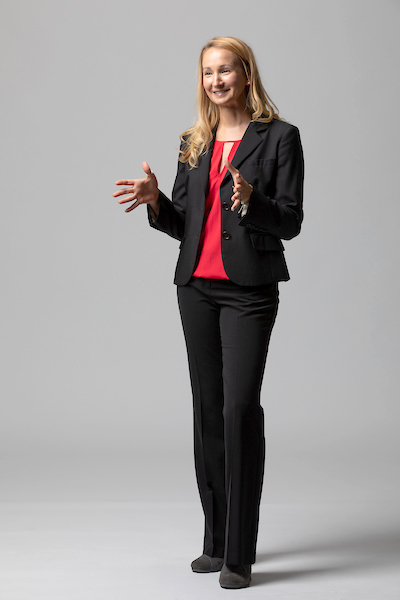
Coming to a classroom near you: team-based learning
By Alicia Auhagen, university marketing and creative services
Kristen Budd refuses to settle. The associate professor of sociology and gerontology and 2019 E. Phillip Knox Distinguished Teaching Award recipient is turning traditional classroom group work on its head with a teaching strategy called team-based learning (TBL). 
Kristen Budd
She discovered TBL at an American Society of Criminology conference and hasn’t looked back. This year, she’s bringing the highly interactive teaching and learning method to nine Miami professors and staff members through a faculty learning community . Alongside three undergraduates — Sami Hausserman (social justice studies and religion double major), Bailey Brown (psychology major) and Cody Vandergrift (international studies and psychology double major) — Budd will help each professor flip a class to the TBL model in a year.
The undergraduates act as sounding boards for members of the faculty learning community, providing feedback on new approaches to course material, learning objectives and their own experiences with TBL.
Q: What is team-based learning?
A: Team-based learning is a collaborative approach to learning that helps students apply their knowledge to solve complex, real-world problems. It encourages students to think deeply, ask questions, defend their assertions and determine the merit of other ideas.
Q: How does it differ from traditional modes of group work?
A: Students typically tell me that with traditional group work, they find it hard to meet for projects outside of class, a few people end up doing most of the work, and communication and accountability are difficult. With TBL, teams are formed through a specific process and all work is done in class. These teams are permanent, which allows them to develop an identity and a shared purpose. Barely a class goes by where teams are not working together to apply their learning in tasks that create an engaged, accountable and supportive classroom environment.
Q: What impact does this method have on the student experience?
A: The TBL classroom becomes highly collaborative and loud, which I view as a good thing. When I used to lecture, there was minimal interaction between students, even with some group tasks. Now, students engage in lively discussion and debate. They are high-fiving during team quizzes and exams, which I never thought I’d see. It is powerful to watch it unfold.
Q: How have your students responded to it?
A: At first, students new to this method are skeptical about working on teams, and some wonder what kind of trickery I am up to. It makes sense, especially when they tell me about their negative experiences with group work. I tell my students there is always a method to my madness and to trust the process. As the semester gets underway, they see how TBL is not at all like traditional group work and how working with their team enhances their learning and the classroom environment. By the end of the semester, most are sold on it. I hear over and over again from my students how this process exposed them to different perspectives and ideas they would not have thought of on their own.
Q: What makes TBL applicable in any field?
A: Because it is a well-defined and theoretically-backed teaching strategy, any field can adopt it. A benefit of TBL and working in teams is nurturing those collaboration skills students will use within the classroom, within their own field of study, and once they enter their profession.
Q: Why is it important to experiment with or adopt new and innovative teaching methods?
A: There is the old adage: “If it ain’t broke, don’t fix it.” What we may not realize is what we are doing in the classroom may actually “be broke” or not working as well as we assume. If we never try anything new, not only do we stifle our own growth as teachers but also our students’ learning. I admit I was terrified when I switched from a traditional lecture format with group work to TBL. But taking the plunge on this teaching strategy was the best thing I ever did. I fell in love with teaching all over again. I witnessed a complete change in the classroom and with my students. If I had one piece of advice for my fellow teachers, it’s this: we should all be brave – try something new. You might be surprised by a new teaching method and ultimately inspired.
